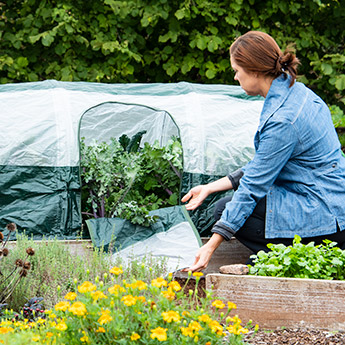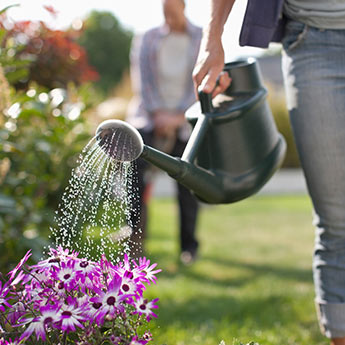A Tilling Tragedy in the Making
-
Helpful Products from Gardens Alive!
-
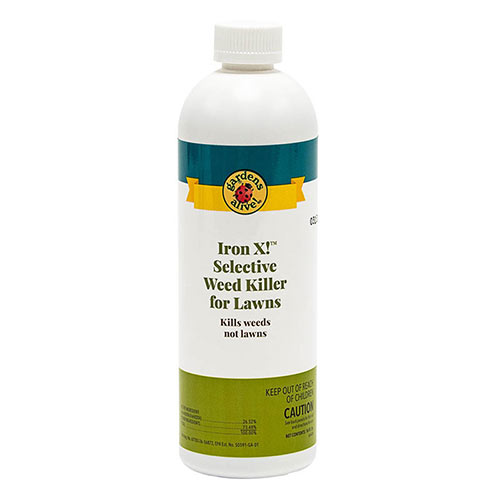 IRON X!™ Selective Weed Killer
IRON X!™ Selective Weed Killer
Q. Mike in Statesville North Carolina writes: "I have an ample supply of fresh cow manure and hay, which I have added to my garden and compost bin. I figure it will winter over and then I'll till it into the soil in the spring. Am I headed down the right path???"
A. No, you are instead headed down the path of despair; specifically the despair of endless weed pulling and poor plant production.
Let's start with what you SHOULD have done (which is the same as with fresh horse manure): Make a big, contained pile of as much of the stuff as possible and let it cook down over the winter. The bigger the pile, the hotter it will get, creating a nice hand-warming spot when you're outside on a chilly day, and more importantly, cooking to death the almost imaginable number of weed seeds that your raw material contains.
Like many herbivores, cows and horses have a very inefficient digestive system that allows any weed or crop seeds they have devoured to survive. If anything, their slow digestive process will have primed the seeds to germinate lustily. If you don't fully compost this raw material at high heat before you till it in, you will end up growing the same plants the horse or cow was eating.
So ixnay on tilling, as it would plant those seeds where you had hoped to grow other things. Back when I was a novice, I tilled a nice batch of fresh horse manure into my raised beds and soon discovered that I had become a farmer of timothy grass and wheat. I got so mad that I started to pull it all out by hand, thus discovering that wheat is SHARP. I looked like The Invisible Man from the elbows down that summer.
Sell the tiller. I realize that many old-time gardeners and farmers enjoy using air-polluting gas-and oil-powered machinery that weighs a ton, makes your arms shake for days, and carries a reasonable risk of amputation, but the act of tilling can only harm your actual soil.
Yes, tilling does loosen up the soil for planting, but it also releases vital nutrients from the soil as it does so, especially Nitrogen, which loves to escape its earthly bonds and go soaring out to play with all of its cousins that make up the majority of the air we breathe, thus robbing your garden of its number one plant food.
Perhaps more importantly, tilling uncovers bazillions of already existing weed seeds as it cuts open the earth, exposing those seeds to sunlight, the trigger for germination! Then what happens? You smooth out that soil (which in other circumstances we would call 'planting'), and then you are shocked! Shocked! to see all those unwanted plants pop up. Be proud of those weeds--you planted and nurtured them perfectly!
Oh, and if that soil is moist, tilling will also destroy the structure of your earthly investment, making it clumpy for years afterwards--and it'll kill lots of earthworms as well.
Doing absolutely NOTHING before planting will yield much better results than planting in tilled soil; you won't have nearly as many weeds to pull.
The smart alternative to tilling is to build raised beds no wider than four feet, thus ensuring that you can reach the center without stepping on your precious growing soil. (Compacted soil is the second biggest human cause of plant death.) At the very LEAST, use stakes and string to make a traffic pattern for your garden. Create dedicated growing areas that are no wider than four feet (they can be as long as you like), surrounded by walking lanes that are at least two feet wide to accommodate your clodhoppers.
(You can use a mulching mower to keep the weeds under control in those walking lanes. Eventually, the clippings will break down and can be shoveled back up on top of your beds for some free fertilizer.)
Come Spring, apply your fully composted soil amendments to the surface of your beds. NEVER mix compost or composted manure in directly; allow it to slowly release its nutrients into the soil. If you use granulated organic fertilizers, apply them to the bare soil and then cover them with an inch or two of compost or composted manure to help those granules release their nutrients faster and protect those nutrients from erosion.
Luckily, Mike hasn't tilled anything in yet, so he can gently rake or hoe the manure off the garden and into one big pile, along with any hay and manure he can rescue from his compost pile. Then just let it sit until it no longer has any heat or obnoxious odor. (It takes a HOT pile to kill weed seeds!) Then it's safe to spread on top of your growing beds.
And those beds have probably been amassing a nice reserve of weed seeds as long as you've been tilling them. To limit this potential problem, run a lawnmower over your designated growing areas until you see dirt blow out the back of the mower. Wait two weeks to ten days. Then use a SUPER-sharp hoe to GENTLY slice any new growth off at the soil line. You are now the proud owner of a 'stale seed' bed, ready to receive your composted manure.
A. No, you are instead headed down the path of despair; specifically the despair of endless weed pulling and poor plant production.
Let's start with what you SHOULD have done (which is the same as with fresh horse manure): Make a big, contained pile of as much of the stuff as possible and let it cook down over the winter. The bigger the pile, the hotter it will get, creating a nice hand-warming spot when you're outside on a chilly day, and more importantly, cooking to death the almost imaginable number of weed seeds that your raw material contains.
Like many herbivores, cows and horses have a very inefficient digestive system that allows any weed or crop seeds they have devoured to survive. If anything, their slow digestive process will have primed the seeds to germinate lustily. If you don't fully compost this raw material at high heat before you till it in, you will end up growing the same plants the horse or cow was eating.
So ixnay on tilling, as it would plant those seeds where you had hoped to grow other things. Back when I was a novice, I tilled a nice batch of fresh horse manure into my raised beds and soon discovered that I had become a farmer of timothy grass and wheat. I got so mad that I started to pull it all out by hand, thus discovering that wheat is SHARP. I looked like The Invisible Man from the elbows down that summer.
Sell the tiller. I realize that many old-time gardeners and farmers enjoy using air-polluting gas-and oil-powered machinery that weighs a ton, makes your arms shake for days, and carries a reasonable risk of amputation, but the act of tilling can only harm your actual soil.
Yes, tilling does loosen up the soil for planting, but it also releases vital nutrients from the soil as it does so, especially Nitrogen, which loves to escape its earthly bonds and go soaring out to play with all of its cousins that make up the majority of the air we breathe, thus robbing your garden of its number one plant food.
Perhaps more importantly, tilling uncovers bazillions of already existing weed seeds as it cuts open the earth, exposing those seeds to sunlight, the trigger for germination! Then what happens? You smooth out that soil (which in other circumstances we would call 'planting'), and then you are shocked! Shocked! to see all those unwanted plants pop up. Be proud of those weeds--you planted and nurtured them perfectly!
Oh, and if that soil is moist, tilling will also destroy the structure of your earthly investment, making it clumpy for years afterwards--and it'll kill lots of earthworms as well.
Doing absolutely NOTHING before planting will yield much better results than planting in tilled soil; you won't have nearly as many weeds to pull.
The smart alternative to tilling is to build raised beds no wider than four feet, thus ensuring that you can reach the center without stepping on your precious growing soil. (Compacted soil is the second biggest human cause of plant death.) At the very LEAST, use stakes and string to make a traffic pattern for your garden. Create dedicated growing areas that are no wider than four feet (they can be as long as you like), surrounded by walking lanes that are at least two feet wide to accommodate your clodhoppers.
(You can use a mulching mower to keep the weeds under control in those walking lanes. Eventually, the clippings will break down and can be shoveled back up on top of your beds for some free fertilizer.)
Come Spring, apply your fully composted soil amendments to the surface of your beds. NEVER mix compost or composted manure in directly; allow it to slowly release its nutrients into the soil. If you use granulated organic fertilizers, apply them to the bare soil and then cover them with an inch or two of compost or composted manure to help those granules release their nutrients faster and protect those nutrients from erosion.
Luckily, Mike hasn't tilled anything in yet, so he can gently rake or hoe the manure off the garden and into one big pile, along with any hay and manure he can rescue from his compost pile. Then just let it sit until it no longer has any heat or obnoxious odor. (It takes a HOT pile to kill weed seeds!) Then it's safe to spread on top of your growing beds.
And those beds have probably been amassing a nice reserve of weed seeds as long as you've been tilling them. To limit this potential problem, run a lawnmower over your designated growing areas until you see dirt blow out the back of the mower. Wait two weeks to ten days. Then use a SUPER-sharp hoe to GENTLY slice any new growth off at the soil line. You are now the proud owner of a 'stale seed' bed, ready to receive your composted manure.
-
Helpful Products from Gardens Alive!
-
 IRON X!™ Selective Weed Killer
IRON X!™ Selective Weed Killer





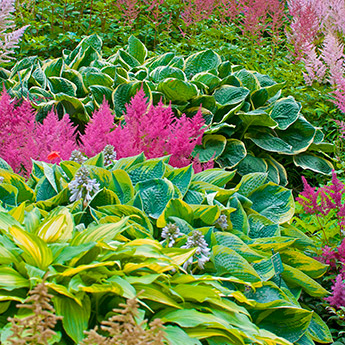
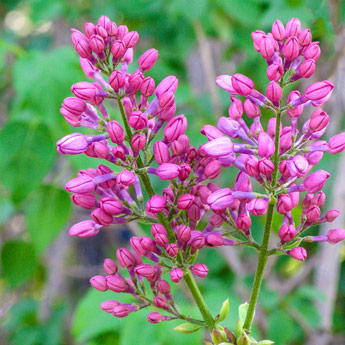
 Gardens Alive! & Supplies
Gardens Alive! & Supplies